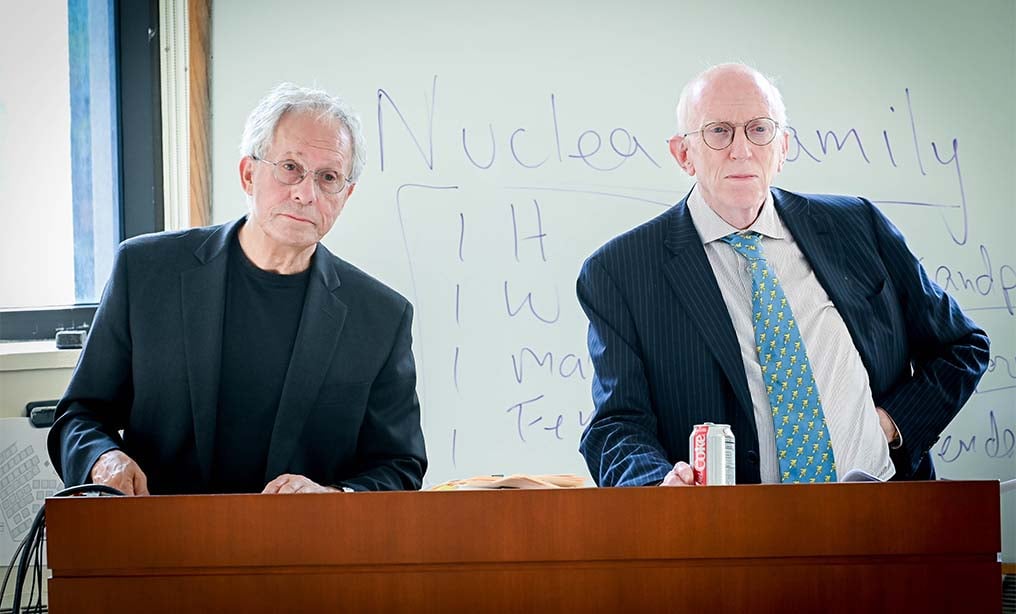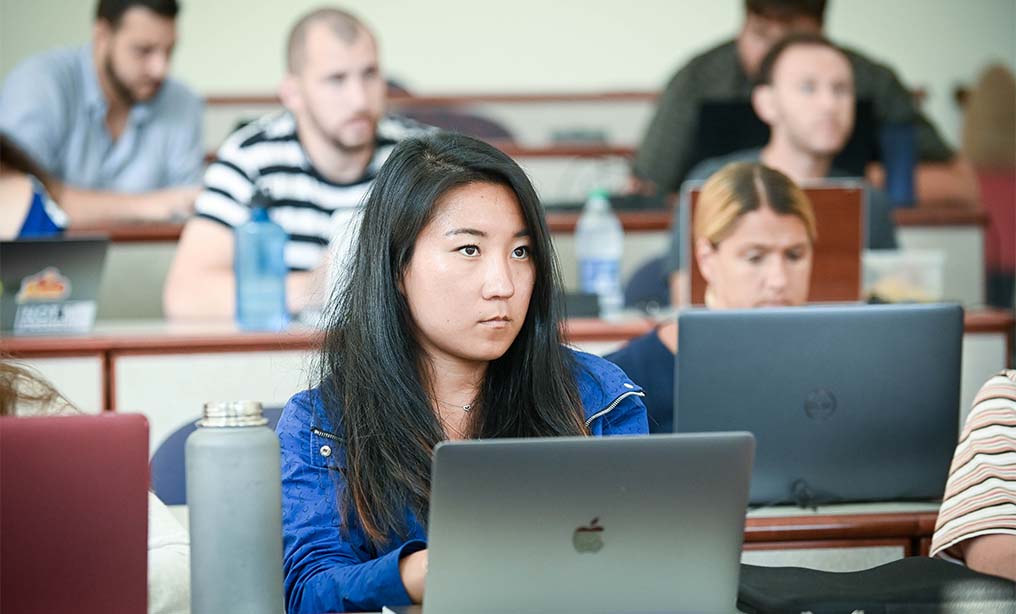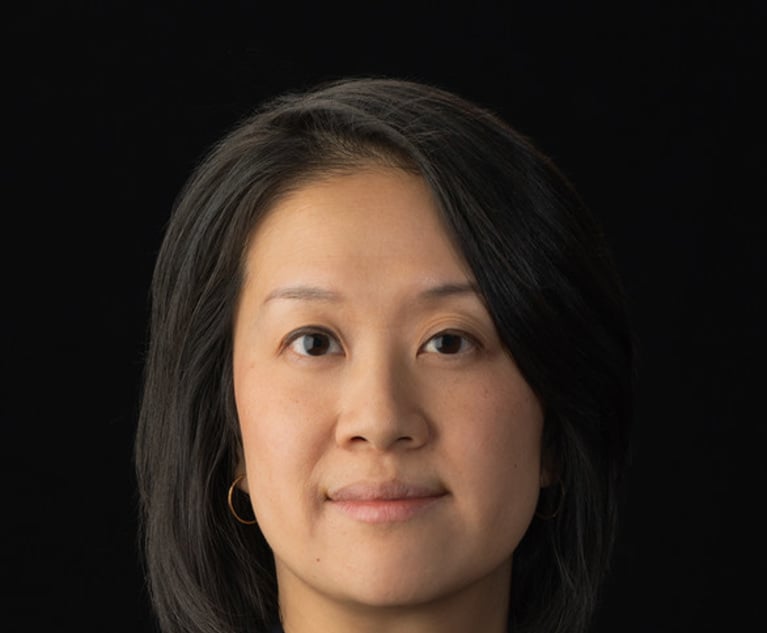New Law School Class Explores How President Trump Is Threatening the Constitutional Order
"The basic premise of the course is that President Trump has through his conduct and his words challenged the constitutional order in a way it has not been challenged in the last century, maybe the last two centuries," said professor David Rudenstine, a former dean at Cardozo Law.
September 06, 2019 at 02:25 PM
5 minute read
 Professor David Rudenstine, left, and co-teacher, retired New York State Court of Appeals Judge Robert Smith during a new course at Cardozo Law School on the Trump presidency. Photo: David Handschuh/NYLJ
Professor David Rudenstine, left, and co-teacher, retired New York State Court of Appeals Judge Robert Smith during a new course at Cardozo Law School on the Trump presidency. Photo: David Handschuh/NYLJ
A former New York Court of Appeals judge who is a conservative Republican and a professor who is a liberal Democrat are teaching a new course at Benjamin N. Cardozo School of Law that examines the impact President Donald Trump is having on the Constitution.
The course concentrates on the legal issues raised by the president's constitutional challenges and is not a political science course but nevertheless it has attracted students who are not happy with the president. When asked by retired Court of Appeals Judge Robert Smith, a partner at Friedman Kaplan Seiler & Adelman who is co-teaching the class, if anyone supported the president, no one came forward.
"I decided to take this course because it provides an opportunity to have thoughtful and meaningful conversations about what I think is the troubling behavior of our president," said Cynthia Joo Park, who is in her last year of law school. "Other than Donald Trump I have never heard of any president who asserts this blanket power to reject any request he doesn't like."
 Law student Cynthia Joo Park in class as professor David Rudenstine and retired New York State Court of Appeals Judge Robert Smith teach a new course at Cardozo Law School on the Trump presidency. Photo: David Handschuh/NYLJ
Law student Cynthia Joo Park in class as professor David Rudenstine and retired New York State Court of Appeals Judge Robert Smith teach a new course at Cardozo Law School on the Trump presidency. Photo: David Handschuh/NYLJSmith, who describes himself as more conservative than the president, is not a Trump fan either. "One of my many worries about Trump is that he'll create a lot of bad law because nobody including me and including many of the federal judges he appointed has any confidence in the man or trusts him."
The course, new this semester, was conceived by David Rudenstine, the former dean of the Benjamin N. Cardozo School of Law at Yeshiva University, who is teaching it along with Smith. Rudenstine said the class was supposed to be a small seminar to facilitate discussion but a lot more students wanted in and so it expanded to 30.
"The basic premise of the course is that President Trump has through his conduct and his words challenged the constitutional order in a way it has not been challenged in the last century, maybe the last two centuries," Rudenstine said. "My guess is that the common ground for people is that the administration has raised a lot of constitutional issues and whether you are in favor or not you'd want to understand what's at stake."
It is not the only law school course that examines the issues through the lens of the Trump presidency. University of California, Los Angeles, School of Law is offering "Law and Lawlessness in the Age of Trump" this semester. Harvard Law School professor Laurence Tribe taught "Constitutional Law 3.0: The Trump Trajectory" in the spring of 2018. And the University of Washington School of Law was one of the first to offer a Trump course shortly after his election, "Executive Power and Its Limits."
At the Cardozo class' first meeting Aug. 28, students discussed Department of Commerce v. New York, the census case decided by the U.S. Supreme Court on June 27.
"We read the Supreme Court opinion and concurrents and dissents, I think that the questions the professor made us really think about were really important," Park said.
Students were asked: How do the claims differ from one another? What information is relevant to each claim? How do the justices differ from one another in their assessment of each claim? And in the end, how would you decide the case? They also discussed speculation by court watchers that Chief Justice John Roberts changed his mind on the outcome as he was writing his opinion.
"The suspicion is based on the assumption that the chief justice would be strongly inclined to be exceedingly deferential to the president on whether a citizenship question may be included in the 2020 census, and thus to vote to permit the question to be included," Rudenstine explained to the students.
Upcoming topics include suing a president for his conduct prior to taking office, the scope of the president's pardon power, the scope of the emolument clauses, impeachment, obstruction of justice and post-presidency prosecution. And the class will spend two sessions looking at Trump's treatment of the press.
Rudenstine was asked why this president has generated so much attention from law schools.
"I'm well aware that presidents in recent years have challenged the constitution," Rudenstine replied. "What sets President Trump apart is the number of ways he's challenged the constitutional order."
Read More:
This content has been archived. It is available through our partners, LexisNexis® and Bloomberg Law.
To view this content, please continue to their sites.
Not a Lexis Subscriber?
Subscribe Now
Not a Bloomberg Law Subscriber?
Subscribe Now
NOT FOR REPRINT
© 2025 ALM Global, LLC, All Rights Reserved. Request academic re-use from www.copyright.com. All other uses, submit a request to [email protected]. For more information visit Asset & Logo Licensing.
You Might Like
View All

Courts Beginning to Set Standards for Evidence Relying Upon Artificial Intelligence
4 minute read
NY Judge Admonished Over Contributions to Progressive Political Causes

Attorneys ‘On the ‘Move: Morrison Cohen Expands White Collar Practice; O’Melveny Brings Back Corporate Finance Partner
6 minute readTrending Stories
- 1'It's Not Going to Be Pretty': PayPal, Capital One Face Novel Class Actions Over 'Poaching' Commissions Owed Influencers
- 211th Circuit Rejects Trump's Emergency Request as DOJ Prepares to Release Special Counsel's Final Report
- 3Supreme Court Takes Up Challenge to ACA Task Force
- 4'Tragedy of Unspeakable Proportions:' Could Edison, DWP, Face Lawsuits Over LA Wildfires?
- 5Meta Pulls Plug on DEI Programs
Who Got The Work
Michael G. Bongiorno, Andrew Scott Dulberg and Elizabeth E. Driscoll from Wilmer Cutler Pickering Hale and Dorr have stepped in to represent Symbotic Inc., an A.I.-enabled technology platform that focuses on increasing supply chain efficiency, and other defendants in a pending shareholder derivative lawsuit. The case, filed Oct. 2 in Massachusetts District Court by the Brown Law Firm on behalf of Stephen Austen, accuses certain officers and directors of misleading investors in regard to Symbotic's potential for margin growth by failing to disclose that the company was not equipped to timely deploy its systems or manage expenses through project delays. The case, assigned to U.S. District Judge Nathaniel M. Gorton, is 1:24-cv-12522, Austen v. Cohen et al.
Who Got The Work
Edmund Polubinski and Marie Killmond of Davis Polk & Wardwell have entered appearances for data platform software development company MongoDB and other defendants in a pending shareholder derivative lawsuit. The action, filed Oct. 7 in New York Southern District Court by the Brown Law Firm, accuses the company's directors and/or officers of falsely expressing confidence in the company’s restructuring of its sales incentive plan and downplaying the severity of decreases in its upfront commitments. The case is 1:24-cv-07594, Roy v. Ittycheria et al.
Who Got The Work
Amy O. Bruchs and Kurt F. Ellison of Michael Best & Friedrich have entered appearances for Epic Systems Corp. in a pending employment discrimination lawsuit. The suit was filed Sept. 7 in Wisconsin Western District Court by Levine Eisberner LLC and Siri & Glimstad on behalf of a project manager who claims that he was wrongfully terminated after applying for a religious exemption to the defendant's COVID-19 vaccine mandate. The case, assigned to U.S. Magistrate Judge Anita Marie Boor, is 3:24-cv-00630, Secker, Nathan v. Epic Systems Corporation.
Who Got The Work
David X. Sullivan, Thomas J. Finn and Gregory A. Hall from McCarter & English have entered appearances for Sunrun Installation Services in a pending civil rights lawsuit. The complaint was filed Sept. 4 in Connecticut District Court by attorney Robert M. Berke on behalf of former employee George Edward Steins, who was arrested and charged with employing an unregistered home improvement salesperson. The complaint alleges that had Sunrun informed the Connecticut Department of Consumer Protection that the plaintiff's employment had ended in 2017 and that he no longer held Sunrun's home improvement contractor license, he would not have been hit with charges, which were dismissed in May 2024. The case, assigned to U.S. District Judge Jeffrey A. Meyer, is 3:24-cv-01423, Steins v. Sunrun, Inc. et al.
Who Got The Work
Greenberg Traurig shareholder Joshua L. Raskin has entered an appearance for boohoo.com UK Ltd. in a pending patent infringement lawsuit. The suit, filed Sept. 3 in Texas Eastern District Court by Rozier Hardt McDonough on behalf of Alto Dynamics, asserts five patents related to an online shopping platform. The case, assigned to U.S. District Judge Rodney Gilstrap, is 2:24-cv-00719, Alto Dynamics, LLC v. boohoo.com UK Limited.
Featured Firms
Law Offices of Gary Martin Hays & Associates, P.C.
(470) 294-1674
Law Offices of Mark E. Salomone
(857) 444-6468
Smith & Hassler
(713) 739-1250






